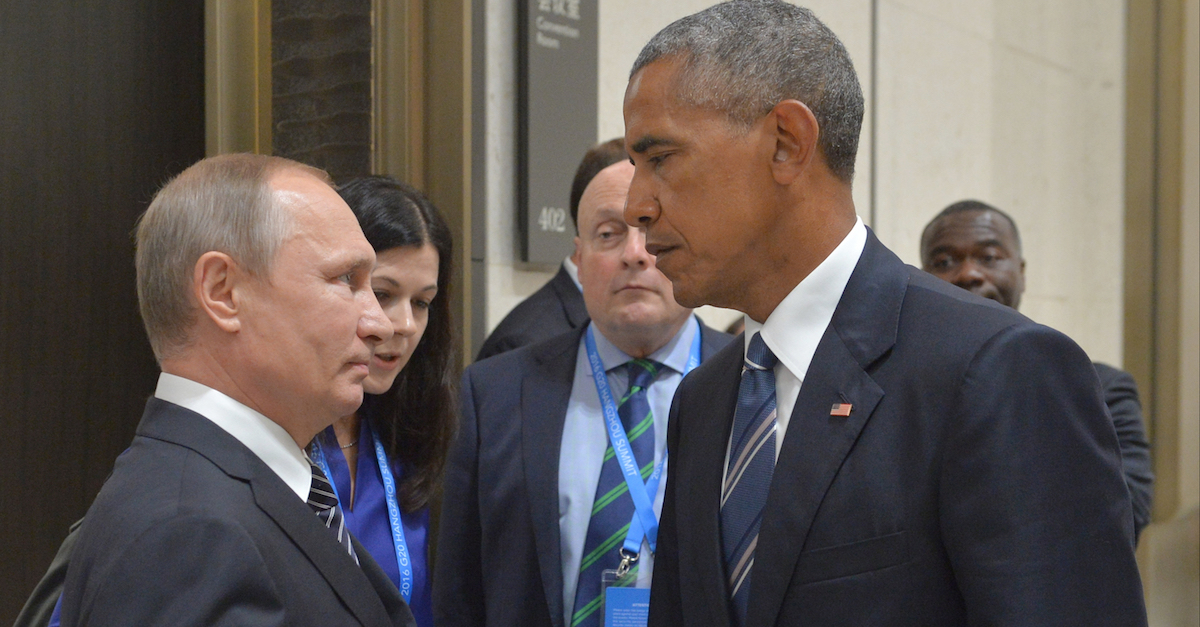On ABC’s “This Week” last Sunday, President Obama had an exhaustive exit interview of sorts with George Stephanopoulos, where he discussed everything from his daughters’ adjustments to life in the White House to whether some of his biggest legislative accomplishments will be undone over the next four years. Obama was in a melancholy mood. He’s probably looking forward to staying out of Washington for the rest of his life.
Videos by Rare
Most of these exit interviews are agreed to by the president’s staff for one purpose: to make the president look good as he heads out the door for the last time. Obama understands that his policy on Russia and his relationship with Vladimir Putin will be closely scrutinized by historians, which is why he insisted that Putin never played him for a fool and that he didn’t underestimate the former KGB operative.
I’ve always thought President Obama got some unfair coverage on the Putin dynamic. He was always depicted as the junior partner in the relationship, someone whose skills, experience, and acumen couldn’t compete with a wily, cold-hearted pragmatist like Putin who knew how to play the game, break international norms when Moscow’s strategic interest called for it, and get away with turning up his nose at the United States. Obama was playing checkers while Putin was the grand chess-master.
RELATED: Our political climate is the most hysterical it’s been since the run-up to the Iraq war
Part of this perception, in all fairness, is based on events. When Russian special forces granted Edward Snowden asylum, refusing to hand over the former NSA contractor to American authorities for prosecution, it was a deliberate slap in the face to the Obama administration for the entire world to see, one that Washington couldn’t really do anything about. When Russian special forces invaded Ukraine’s Crimean Peninsula and took over the territory in less than 24 hours, the Obama administration scrambled for a response. After Putin’s order to deploy the Russian air force and military advisers into Syria, bombing the moderate opposition that the U.S. supported and preserving a dictatorship that the U.S. wanted to replace, Obama’s confident assertion that Moscow was in for a world of hurt circa 1980s Afghanistan proved to be wildly premature.
It seems like Putin outfoxed Obama every step of the way.
Obama, though, deserves some credit on the Russia file. The New START nuclear weapons reduction treaty and the administration’s ability to make an effective case for it to some Senate Republicans wouldn’t have happened were it not for a focused effort on nuclear non-proliferation by Obama and his national security team. The economic sanctions on Russia’s banking, defense, and financial industries in response to its annexation of Crimea and destabilization of Eastern Ukraine wouldn’t be having the impact on Russia’s economy today (Russian foreign exchange reserves have declined from $537.4 billion at the beginning of January 2013 to $379.1 billion in December 2016) if the administration hadn’t persuaded the European Union to enact its own comprehensive sanctions regime and keep the measures in place until Moscow ended its military and economic assistance to the anti-Kiev rebellion.
RELATED: Take a deep breath over Russian hacking, before we end up starting another war
And it should be remembered that previous American presidents have had just as much trouble with the Russians. President George W. Bush didn’t exactly bring Russia to heel: Moscow killed any opportunity that the U.S. might have had to pass a Security Council resolution authorizing military force against Saddam Hussein when it partnered with China, France, and Germany. Putin’s decision to invade Georgia in 2008 effectively defied U.S. demands that the Kremlin respect the sovereignty of its post-Soviet neighbors. Bill Clinton had a much more positive relationship with Boris Yeltsin, but even Moscow in its weakened state blocked Security Council approval for military action in Iraq in 1998 and Kosovo in 1999. When Clinton authorized air strikes against Saddam’s WMD facilities anyway, Yeltsin went ballistic.
President Obama will go down as yet another American president who couldn’t get Putin to submit. This has less to do with Obama than the fact that Russia will never capitulate to U.S. dictates.



